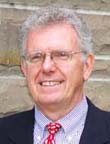Themes emerge in Korn/Ferry summary of presidential search
By Franklin Crawford

As Cornell University Presidential Search Committee (PSC) members continue to gather input from various groups and individuals, several themes have emerged pertaining to the search itself and the characteristics the Cornell community would like to see in the university's next president.
The search firm Korn/Ferry outlined those themes in three broad categories and presented them to the full committee during a meeting at the Cornell Club in Manhattan on Sept. 21. They are:
- Major challenges the new president will inherit.
- Preferred characteristics and attributes of the new president.
- Reasons why excellent individuals should want to lead Cornell.
The Korn/Ferry constituent summary presages many of the ideal candidate qualifications and challenges outlined in depth in The Cornell Opportunity statement, a 24-page primer for nominees now posted on the PSC Web site http://www.cornell.edu/presidentsearch/.
Among "major challenges," there is, of course, fund raising, as well as a concern that the new president be capable of quickly grasping the complexity of the entire Cornell community. In addition, the new president should possess excellent people skills and be diplomatic. Other challenges include the ability to attract and hire top-notch faculty as well as people to fill key vacancies in the administration; a keen sense of priority when it comes to curricula and programming issues; and enough political savvy to maintain and build upon relationships with the state governor's office, the legislature, the SUNY system and Washington, D.C., agencies.
The "preferred characteristics" category echoed some of the "major challenges" themes, with the addition of qualities such as understanding the unique challenges of a major health science center -- Weill Cornell Medical College -- and a global perspective on the internationalization of undergraduate and graduate education.
A tall order, for sure. But the final category indicated why candidates would want to rise to it. Under "Reasons why" there is the fact that Cornell is a world-class university with outstanding faculty and students and strong alumni connections. The university is robust and stable, continues to grow, and is in an important phase of its history, and Cornell's new leader would have the opportunity to make a difference at an important time. These facts may be self-evident, but they bear emphasis while the search is on.
Schuler joins committee
Among other results from meetings with various groups was the addition of two new faculty members to the search committee. One of them is Richard Schuler, a professor in the Department of Economics and the School of Civil and Environmental Engineering.
"My objective in serving on the search committee is the same as the other members: to help find the best possible president to lead Cornell over the next decade," Schuler said. "Although I've just recently been appointed, the tone of our discussion is open, with a willingness to share ideas."
Schuler joined the Cornell faculty in 1972. He earned his B.E. degree from Yale University in 1959, his M.B.A. from Lehigh University in 1969 and his Ph.D. from Brown University in 1972.
From 1981 to 1983, Schuler was a commissioner and deputy chairman in the New York State Public Service Commission. Since its formation in 1998, he has been a member of the board of the New York Independent System Operator (responsible for operating the state's electricity system and conducting its wholesale markets), where he chairs the Market Performance Committee and serves on the Governance and Adequacy and Reliability Committees.
In addition to teaching in the Cornell College of Engineering since 1991, he also has taught a course in Cornell's Johnson Graduate School of Management on government's interface with business. Among his other activities at Cornell, Schuler served from 1995 to 2001 as director of the Cornell Institute for Public Affairs' Master of Public Administration degree program, and from 1987 to 1993 as director of the Cornell Waste Management Institute and associate director of the Center for the Environment.
"Going forward, I am certain -- and hope -- our members will have different views and perspectives about what is best for Cornell, let alone how that is embodied in individual candidates," Schuler said. Those differences in perspective will be healthy and essential if we are to select an effective leader, since Cornell is so diverse."
Schuler served as an elected faculty trustee on Cornell's Board of Trustees from 1994 to 1998 and was a member of the board's Executive Committee from 1996 to 1998.
"No mortal could possibly encompass the intellectual, administrative, political, financial and interpersonal leadership skills we demand of our presidents," Schuler said. "And so while I was nominated to the committee by the faculty and therefore feel a particular obligation to see that strong sentiments held widely by the faculty and other constituencies on campus are fairly represented in these discussions, in the end, our deliberations will be based upon our own evolving views about what's best for Cornell."
For a complete description of all PSC members, visit the search committee Web site at http://www.cornell.edu/presidentsearch/.
Media Contact
Get Cornell news delivered right to your inbox.
Subscribe